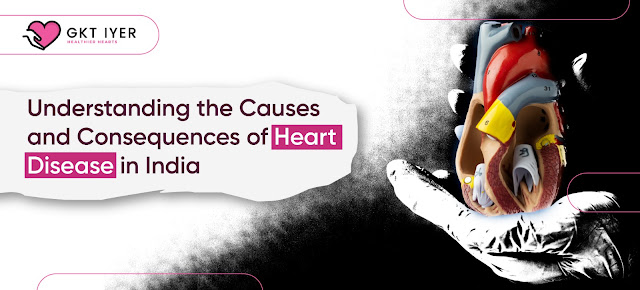Understanding the Causes and Consequences of Heart Disease in India
Heart disease is a growing health concern in India. According to the World Health Organization (WHO), heart disease is the leading cause of death in the country, accounting for more than 28% of all deaths. This figure is expected to rise in the coming years, as more and more Indians adopt unhealthy lifestyles and diets. In this blog, we will examine the causes and consequences of heart disease in India, as well as some possible solutions to this growing health problem.
Causes of Heart Disease in India
Several factors contribute to the high prevalence of heart disease in India. Some of the key causes include:
- Unhealthy Lifestyle: Unhealthy lifestyle choices are one of the leading causes of heart disease in India. A sedentary lifestyle, poor diet, smoking, and excessive alcohol consumption all contribute to the development of heart disease. According to a study conducted by the Indian Council of Medical Research, over 60% of adults in India lead a sedentary lifestyle, which increases the risk of developing heart disease.
- Genetics: Genetic factors also play a role in the development of heart disease. Indians are more susceptible to heart disease due to genetic factors such as high levels of lipoprotein(a) and other lipid abnormalities.
- Diabetes: Diabetes is another major risk factor for heart disease in India. According to the International Diabetes Federation, India has the second-highest number of people with diabetes in the world, with over 77 million people suffering from the disease. Diabetes is associated with high blood sugar levels, which can damage blood vessels and increase the risk of heart disease.
- High Blood Pressure: High blood pressure is a common health problem in India, with more than one-third of adults suffering from hypertension. High blood pressure increases the workload on the heart and can lead to heart disease.
- Obesity: Obesity is also a major cause of heart disease in India. According to a study conducted by the Indian Council of Medical Research, the prevalence of obesity has doubled in India over the past decade. Obesity is associated with a range of health problems, including heart disease.
Consequences of Heart Disease in India
Heart disease has significant consequences for individuals and society as a whole. Some of the key consequences of heart disease in India include:
- Increased Healthcare Costs: Heart disease is a costly disease to treat. The cost of treatment for heart disease can be a significant burden on families, particularly those from low-income backgrounds.
- Reduced Productivity: Heart disease can lead to reduced productivity due to time off work for treatment and recovery. This can have a significant impact on the economy, particularly in industries that rely on manual labor.
- Disability and Death: Heart disease can lead to disability and death, reducing the quality of life for individuals and their families. This can have significant emotional and economic consequences for society as a whole.
- Increased Burden on Healthcare System: As the prevalence of heart disease increases in India, there is an increased burden on the healthcare system. This can lead to longer wait times for treatment, reduced access to healthcare for those in need, and increased strain on healthcare professionals.
Solutions to Heart Disease in India
There are several solutions to heart disease in India. Some of the key solutions include:
- Lifestyle Changes: Encouraging individuals to adopt a healthy lifestyle can significantly reduce the risk of heart disease. This can include regular exercise, a balanced diet, quitting smoking, and reducing alcohol consumption.
- Education and Awareness: Education and awareness campaigns can help individuals understand the risks associated with heart disease and how to reduce their risk. This can include information on healthy lifestyle choices, the importance of regular check-ups, and the signs and symptoms of heart disease.
- Early Diagnosis and Treatment: Early diagnosis and treatment of heart disease can significantly improve outcomes. This can involve regular health screenings and check-ups, as well as access to appropriate medical care for those who are diagnosed with heart disease.
- Public Health Policies: Public health policies can play a significant role in reducing the prevalence of heart disease in India. Policies that encourage healthy eating habits, physical activity, and reduced tobacco and alcohol consumption can have a significant impact on reducing the risk of heart disease.
- Research and Innovation: Research and innovation in the field of heart disease can help develop new treatments and technologies that can improve outcomes for individuals with heart disease. This can include new medications, surgical techniques, and devices that can monitor and manage heart disease.
- Improved Healthcare Infrastructure: Improved healthcare infrastructure can help ensure that individuals with heart disease have access to the care they need. This can involve increasing the number of healthcare facilities, improving the quality of care provided, and training healthcare professionals to provide specialized care for individuals with heart disease.
Conclusion
Heart disease is a growing health concern in India, with significant consequences for individuals and society as a whole. While there are several causes of heart disease, including genetics and lifestyle factors, there are also several solutions that can help reduce the prevalence of the disease. These solutions include lifestyle changes, education, and awareness campaigns, early diagnosis and treatment, public health policies, research and innovation, and improved healthcare infrastructure. By addressing these factors, we can help reduce the burden of heart disease in India and improve the health and well-being of individuals and communities across the country.


Comments
Post a Comment